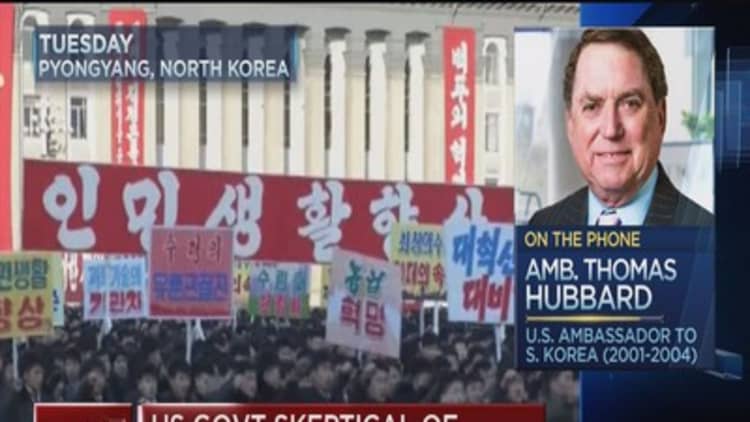

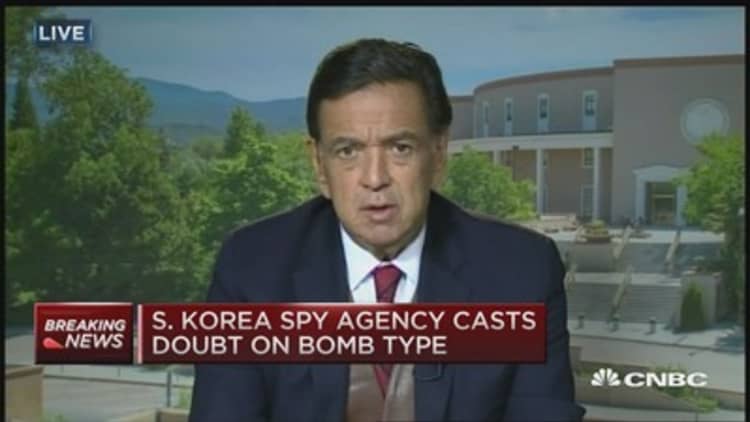
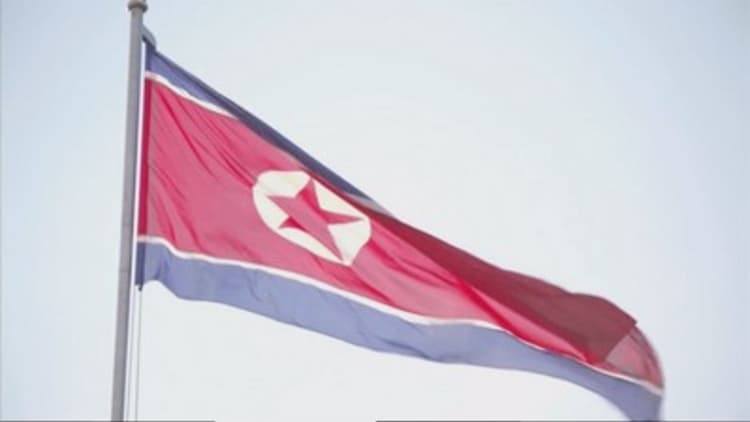
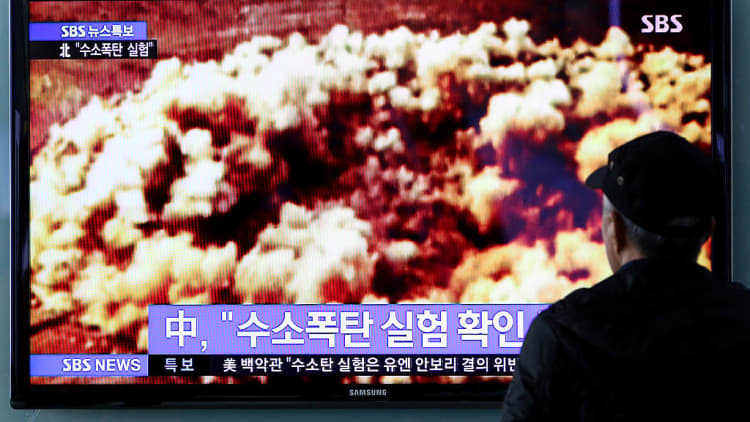
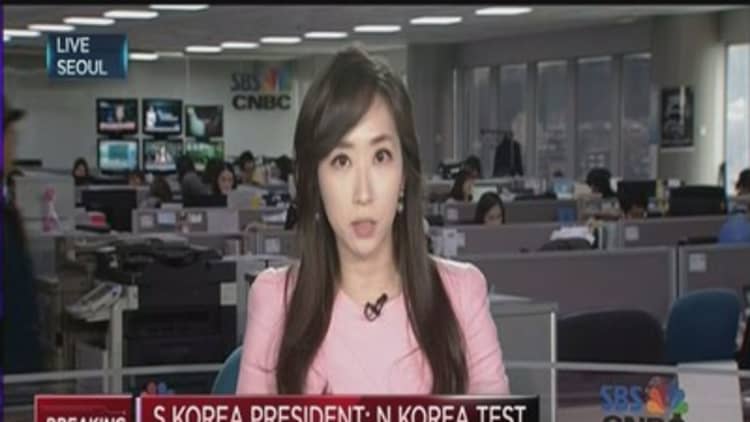
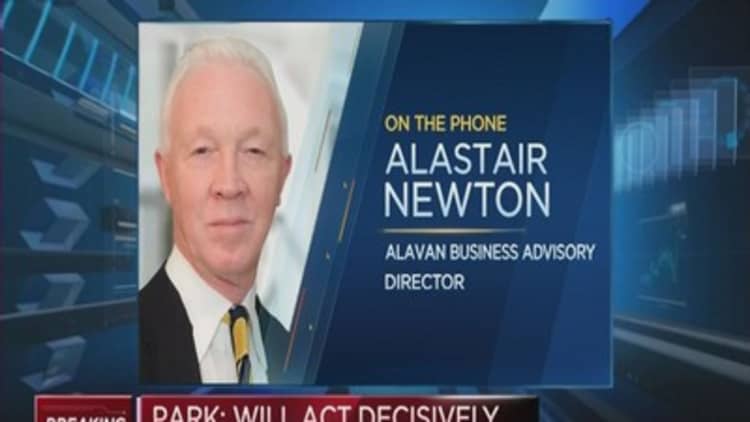
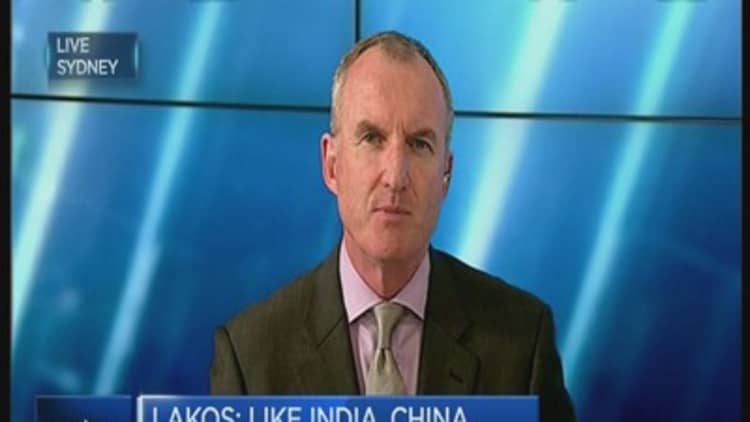
North Korea claimed it detonated a hydrogen bomb in a test Wednesday, a move that was condemned by the U.S., Britain, Japan and even China. It was the politically isolated country's first nuclear weapons test explosion in three years.
Experts said the claim that the test involved a hydrogen bomb, which is more powerful than an atomic bomb, could not be confirmed. The White House said that initial analysis of the test was not consistent with a successful hydrogen bomb.
The report on the state KCNA website came within hours of reports from various agencies that a large earthquake had been detected near a known North Korean nuclear test site.
According to KCNA, North Korea tested a miniaturized hydrogen nuclear bomb "in the most perfect manner," putting it in possession of hydrogen bomb capability, which it described as "the most powerful nuclear deterrent."
Read More World condemns North Korean H-bomb test
North Korea wanted what it called "the H-bomb of justice" as protection from the "ever-growing nuclear threat and blackmail by the U.S.-led hostile forces," according to KCNA.
It would use the weapons only if its sovereignty were encroached upon, the statement on KCNA said, but would not roll back its nuclear development until the U.S. had dropped its "vicious, hostile" policy toward the isolated Communist state.
"The U.S. is a gang of cruel robbers which has worked hard to bring even a nuclear disaster to the DPRK [Democratic People's Republic of Korean], not content with having imposed the thrice-cursed and unheard-of political isolation, economic blockade and military pressure on it for the mere reason that it has differing ideology and social system," according to the statement.
"The present-day grim reality clearly proves once again the immutable truth that one's destiny should be defended by one's own efforts," the statement went on. "Nothing is more foolish than dropping a hunting gun before herds of ferocious wolves."
It was North Korea's first nuclear test since February 2013 and the fourth overall.
Japan reacts with anger
Japanese Prime Minister Shinzo Abe quickly condemned the test as a threat to Japan's security, and he vowed a firm response. Japan "absolutely cannot tolerate" a North Korean nuclear test, he said.
Shortly after, South Korean President Park Geun-hye said Pyongyang would "pay the price" for the test, and that it would seek additional United Nation sanctions against its neighbor.
At the same time, according to South Korean news agency Yonhap, government officials noted that they needed to perform additional tests to ascertain that North Korea had actually tested a hydrogen nuclear device.
Intelligence sources told Yonhap that the device may not have been an H-bomb, while other Korean media cited defense sources as saying that North Korea may have added a small amount of hydrogen to the device tested.
Reuters reported that the Korean Meteorological Administration had detected no radiation from the apparent test.
China, which is one of North Korea's few allies, also criticized the test. Foreign Ministry spokeswoman Hua Chunying said the government in Beijing "strongly opposes" it and urged North Korean leader Kim Jong Un to "stop any action which could worsen the situation," according to NBC News.
China's state news agency, Xinhua, wrote that the test was at odds with the goal of de-nuclearization, adding that any action that disrupted the stability of Northeast Asia was "undesirable and unwise."
In Washington, the State Department condemned the apparent breach of U.N. sanctions. The White House said U.S. and Chinese officials have already held conversations, and China and Russia echo American concerns about the test, according to Reuters.
The U.S. is committed to the safety of allies Japan and South Korea, the White House added.
Russia's U.N. envoy called for "cool heads" and a "proportionate response," according to Reuters.
Britain's Foreign Secretary Phillip Hammond said that such a test would be a "grave breach" of U.N. resolutions; North Korea is already under U.N. sanctions for having conducted previous nuclear tests, the first as early as 2006.
Reuters reported that the U.N. Security Council would hold an emergency meeting at 11 a.m. ET (4 p.m. GMT) to discuss the test, at the request of the U.S. and Japan. U.N. Secretary-General Ban Ki-Moon condemned the apparent test, calling it "deeply troubling" and "profoundly destabilizing for regional security.
The apparent test shows that North Korea "is more than prepared to pay the price of getting its wrist slapped" by additional U.N. sanctions or resolutions, said Richard Haass, president of the Council on Foreign Relations. North Korea may not scale back its nuclear ambitions until it faces significant retribution from China, he told CNBC.
"Only China, I think has the latent leverage to get the North Koreans to change their behavior. And China, at least up to now, hasn't been willing to do that because they're worried, among other things, about causing instability on the peninsula," Haass told CNBC's "Squawk on the Street."
Former U.S. ambassador to South Korea Thomas Hubbard told CNBC he would "assume the Security Council will choose to impose some additional sanctions."
"I do think it's crucial that the Chinese will fulfill them," he said on CNBC's "Squawk Alley."
Word of the nuclear test emerged shortly after 9 a.m. SIN/HK, when the U.S. Geological Survey said it had detected a magnitude 5.1 earthquake about 49 kilometers (30 miles) a known North Korean nuclear test site, according to its coordinates. The USGS said that the earthquake, near the site called Punggye-ri, was about 10 km below the Earth's surface.
The magnitude of the North Korean seismic event appears to have been slightly less than a similar one in 2013, the head of the Comprehensive Nuclear-Test-Ban Treaty Organization said.
The Korean Meteorological Administration said that it detected the epicenter of the quake at a depth of "0 kilometers." It put the magnitude at 4.2.



